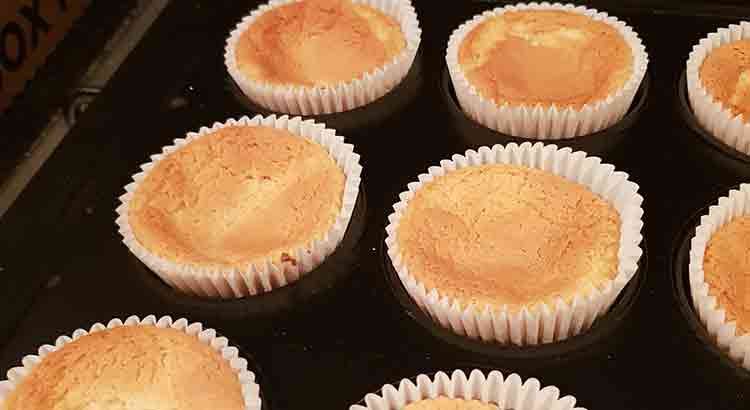Are you tired of your muffins always sinking in the middle, no matter how carefully you follow the recipe? Well, don’t worry! You’re not alone. Sinking muffins are a common issue that can happen to even the most experienced bakers. But fear not, we have some simple tips and tricks to help you fix this problem and achieve perfect, fluffy muffins every time!
The biggest reasons why muffins sink in the middle is overmixing the batter. When you overmix the batter, the gluten network will sole its elasticity, so it won’t be able to support the muffins weight, and will collapse.
But overmixing is not the only thing that can make your muffins sink. In this article, we will cover the top seven reasons why muffins sink and provide tips on how to fix them. So, let’s get started and bake some delicious, perfectly risen muffins together!
1. Overmixing
Overmixing is a common mistake that many people make when baking muffins. When you overmix the batter, you are essentially creating too much gluten. Gluten is the protein that gives bread its structure and chewiness. While gluten is essential in bread, it is not desirable in muffins. Too much gluten in muffins will result in a tough and dense texture.
To avoid overmixing, it is important to mix the batter until the dry ingredients are just combined with the wet ingredients. Use a spatula or wooden spoon to gently fold the ingredients together. Do not use an electric mixer, as it will overwork the batter and create too much gluten. A few lumps in the batter are okay, as they will disappear during baking.
2. Using Too Much Sugar
Sugar is an essential ingredient in muffins as it adds sweetness and helps to brown the muffins. However, using too much sugar can cause the muffins to sink in the middle. When sugar is mixed with liquid ingredients, it creates a syrup that can weigh down the muffin batter. The extra weight can cause the muffins to collapse in the middle while baking.
To avoid using too much sugar, always follow the recipe carefully. If you are unsure about the amount of sugar to use, start with less and add more as needed. You can also try using a sugar substitute, such as honey or maple syrup, which are less dense than granulated sugar. Finally, be sure to mix the sugar with the dry ingredients before adding the wet ingredients to the mixture. This will prevent the sugar from sinking to the bottom of the batter and weighing it down.
3. Overfilling the Muffin Cups
Overfilling the muffin cups is a common mistake that many people make when baking muffins. When you overfill the cups, the batter will spill over the edges and cause the muffins to sink in the middle. It is important to fill the muffin cups only two-thirds full to allow room for the muffins to rise.
To avoid overfilling the muffin cups, use an ice cream scoop or a spoon to fill the cups. Do not use a measuring cup, as it can be difficult to pour the batter into the cups without spilling. If you do spill batter into the muffin tin, use a clean, damp cloth to wipe it up before baking. Finally, if you have extra batter, use it to make a few mini muffins in a separate muffin tin.
4. Too Much Leavening Agent
Using too much leavening agent, such as baking powder or baking soda, can cause the muffins to sink in the middle. Leavening agents release carbon dioxide gas when mixed with liquid ingredients, which causes the muffins to rise. If too much leavening agent is used, the muffins will rise too quickly and then collapse.
5. Not Using Enough Leavening Agent
Not using enough leavening agent can also cause the muffins to sink in the middle. Muffins rely on leavening agents to rise and become light and fluffy. If not enough leavening agent is used, the muffins will be dense and heavy.
To avoid not using enough leavening agent, always follow the recipe carefully. If you are unsure about the amount to use, double-check the recipe or consult a baking book or website. You can also try adding a little more leavening agent to the batter to achieve the desired rise.
6. Not Preheating the Oven
Not preheating the oven before baking the muffins can also cause them to sink in the middle. Preheating the oven allows it to reach the correct temperature before the muffins are added, which is important for proper baking. If the oven is not hot enough, the muffins will not rise properly and will sink in the middle.
To avoid this problem, always preheat the oven according to the recipe instructions. It is usually recommended to preheat the oven for at least 10-15 minutes before adding the muffins. You can also use an oven thermometer to ensure that the oven has reached the correct temperature. Finally, if you need to bake the muffins in batches, be sure to preheat the oven again before baking the second batch.
7. Opening the Oven Door Too Often
Opening the oven door too often while the muffins are baking can cause them to sink in the middle. Every time the oven door is opened, the temperature inside the oven drops, which can affect the baking process. If the temperature drops too much, the muffins will not rise properly and will sink in the middle.
To avoid this problem, try to resist the urge to open the oven door while the muffins are baking. Use the oven light or a timer to check on the muffins instead. If you need to rotate the muffin tin or check for doneness, do it quickly and close the oven door as soon as possible. Finally, if you need to add or remove anything from the oven while the muffins are baking, do it quickly and try to keep the door closed as much as possible.
Final Thoughts
Baking muffins is a delicious and enjoyable activity, but it can be frustrating when they don’t turn out the way you want them to. Hopefully, these tips have helped you understand why your muffins may be sinking in the middle and how you can fix the problem. Remember, baking is a science and requires precise measurements and techniques to achieve the desired results.
One of the most important things to remember when baking muffins is to always follow the recipe carefully. Baking is not the time to experiment or make substitutions unless you are an experienced baker. If you are unsure about something in the recipe, consult a baking book or website for guidance.
Finally, don’t get discouraged if your muffins don’t turn out perfectly the first time. Baking takes practice, and even experienced bakers have their failures. Keep trying and learning from your mistakes, and soon you’ll be baking perfect muffins every time. And remember, even if your muffins sink in the middle, they will still taste delicious!

